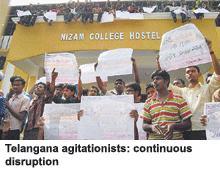The resurgence of the popular agitation for carving out a separate state of Telangana from the south-eastern seaboard state of Andhra Pradesh (AP, pop.76 million) with the prosperous hi-tech city of Hyderabad (pop. 4 million) as its capital, has hit the academic community — especially school-going children — hard. As is usual in such sub-nationalist agitations, college and university students are in the forefront of the Telangana movement, and collegiate and university time-tables have been gravely upset by the on-and-off protests. For instance, on January 20, hundreds of students of Osmania University and its constituent colleges including Nizam College and Koti Women’s College boycotted their postgrad semester examinations in support of the Telangana agitation. Although the university authorities maintained that examinations of MA, M.Sc, M.Com and MCA degree programmes would continue as per schedule, around 90 percent of the varsity’s 34,746 students reportedly boycotted their examinations by tearing up their answer scripts and hall tickets in 137 exam centres across the state.
 The demand for a separate Telangana state was voiced as early as 1969, shortly after the state of Andhra Pradesh was carved out of the Madras Presidency in 1956. With a large number of people disaffected with perceived regional injustices such as distribution of water, budgetary allocations and employment opportunities, several political formations — particularly the Telangana Rashtriya Samiti (TRS) — began to clamour for a separate Telangana state with 41 percent of the area of AP and 30 million population, and Hyderabad as its capital. Inevitably this movement has been opposed by the people of the rest of the state, particularly the more affluent and entrepreneurial people of coastal AP who contend that their savings and investment have transformed Hyderabad from a sleepy provincial town into one of the country’s most vibrant education and IT industry hubs.
The demand for a separate Telangana state was voiced as early as 1969, shortly after the state of Andhra Pradesh was carved out of the Madras Presidency in 1956. With a large number of people disaffected with perceived regional injustices such as distribution of water, budgetary allocations and employment opportunities, several political formations — particularly the Telangana Rashtriya Samiti (TRS) — began to clamour for a separate Telangana state with 41 percent of the area of AP and 30 million population, and Hyderabad as its capital. Inevitably this movement has been opposed by the people of the rest of the state, particularly the more affluent and entrepreneurial people of coastal AP who contend that their savings and investment have transformed Hyderabad from a sleepy provincial town into one of the country’s most vibrant education and IT industry hubs.
In 2004 while fighting the general election the Congress party allied with TRS, promising a separate Telangana state. But this promise was not fulfilled following opposition from Andhra Pradesh chief minister and Congress strongman Rajashekhar Reddy. Therefore following the chief minister’s untimely death in a helicopter crash, in November 2009 the TRS renewed its agitation for a separate Telangana with the party’s leader K. Chandrasekhar Rao undertaking a fast-unto-death to press the demand.
In early 2010 the Union government conceded the demand of a separate Telangana state prompting counter-protests by other political parties in AP. Therefore in February 2010 the UPA-II government appointed the Justice Srikrishna Commission to re-examine the pros and cons of legislating a Telangana state. The report of the Srikrishna Committee which presented six solutions — including formation of a separate Telangana state with Hyder-abad as its capital — for consideration of the government is somewhat ambiguous. Consequently the pro-Telangana agitation spearheaded by students of Osmania University has continued.
Against this backdrop of continuous disruptions of life and academic calendars in AP and Hyderabad in particular, school managements are driven to desperate measures to ensure that syllabuses and curriculums are completed on schedule. “Schools have already lost 26 working days so far this year, and most of our member schools are way behind in completing their syllabuses for the board exams scheduled for March-April 2011,” says S. Srinivas Reddy, convener, AP Private Schools Management Association which has a membership of 600 K-12 private schools with an aggregate enrolment of over 600,000 students.
To make up for lost classroom time, some private school managements in Hyderabad have adopted unusual measures. “We have developed a mobile teaching methodology under which our school teachers visit pre-determined locations and teach core subjects such as math, science etc to our students,” says D. Chandrashekar, chief operating officer of the Bangalore-headquartered Jain Group of Institutions (JGI) which has promoted the Jain Heritage School and Jain International School (aggregate enrolment: 5,200 K-12 students) in Hyderabad.
Other schools — Meridian (all branches), Chirec (all branches), P Obul Reddy High School, Jubilee Hills and Sr. Nivedita School, Begumpet — canceled the Christmas vacation to hold classes. Meanwhile several schools including the highly-rated Chirec School teach for an extra hour daily and Delhi Public School, Hyderabad has been conducting extra classes on Saturdays.
Typically, government officials for whom education of children and youth in government schools matters little, tend to dismiss the Telangana issue which has cost the economy thousands of man days lost, as a storm in a teacup. “I don’t think the Telangana agitation will have any impact on the education system as a whole, and I am confident that school curriculums will be completed on time,” says Dr. R. Satyanarayana, commissioner and director of school education.
If wishes were horses…
S. Pratibha (Hyderabad)